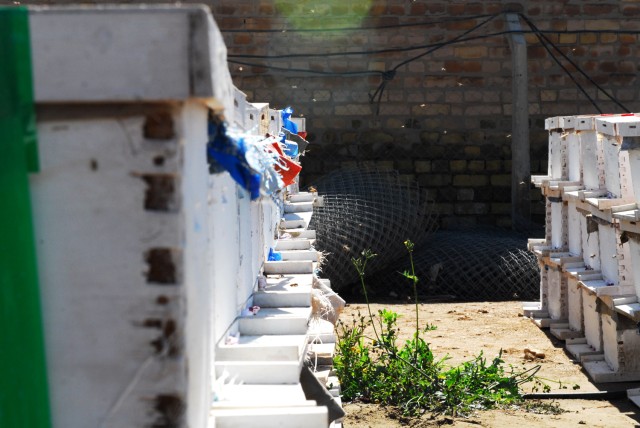A class that teaches local Iraqis how to raise and care for honey bees graduated its first students in Husaniyah, Iraq, March 1, 2010.
Members of the U.S. State Department's Karbala Provincial Reconstruction Team and Soldiers with 2nd Platoon, Company D, 2nd Battalion, 69th Armor Regiment, attended the beekeeping course graduation.
"Our [Karbala PRT] mission is to assist the Iraqis with capacity building," said Sgt. Fatimah Muhammad, from Chicago, Ill., the 308th Civil Affairs Bn. rule-of-law noncommissioned officer in charge.
Part of that mission includes teaching women job skills that will help them participate in society and be economically independent, she said. Muhammad is embedded with the Karbala PRT as the women's initiatives coordinator.
The graduating class had 20 students, and around 80 percent of them were widows, said Muhammad.
The class taught practical skills, so the women could harvest honey, as well as theories about bees and beekeeping.
The goal was to teach skills that would benefit more than the class members alone, Muhammad said.
"It's a skill set they can teach others," she said, "They can take it to their communities and empower other women and help them earn an income off of it."
There are plans to extend the course to three other areas in the Karbala Province and enlarge the classes to 20 or 30 people.
At the graduation, the women were given a certificate of completion, five hives with bees, and equipment to harvest the honey, such as protective masks and gloves.
"It's a low-cost program that will be appreciated," said John Kincannon, of Chaska, Minn., the Karbala PRT team leader.
Muhammad also addressed the graduates and asked them how the class went and what other classes they would like to see conducted.
They suggested classes in poultry farming and sewing.
The course was taught at the Agricultural Extension, a local branch of the local Agricultural Community College.
Karbala, one of the nine provinces making up United States Division - South, is not the first to look to beekeeping as a way to help the people help themselves.
"The beekeeping project has a larger history that has been going on in USD-S for a while," said Kincannon.
Success with similar projects in Basra Province led to the efforts in Karbala, said Kincannon.
In some ways, the effort is one to regain something that had been lost.
"Iraq had a strong honey industry and they're trying to rebuild it," said Muhammad.
Part of the follow-up for the graduates will be getting the honey sold locally and in the neighboring Babil Province, which has a higher demand for honey and even houses a honey factory.
The Karbala Beekeeping Association and the Agricultural Extension were important partners in creating the class and in teaching the skills, said Muhammad.
"They are the subject matter experts," she said.
The PRT also procured financial support through the use of Quick Release Funds by submitting a proposal that explained the capacity-building potential of the program.
Beekeeping is just one of several projects that the Karbala PRT and the college are involved in together.
Another project is focused on creating an agriculture lab that will be used to help with the problem of soil salinity, a dilemma for the region that dates back to the time of Hammurabi, said Kincannon.
One solution being looked at is Bermuda grass, a native plant of the province, which naturally removes salt and can be used as animal feed.
A similar project makes use of mobile test kits that will allow farmers to plant crops in various soils by assessing the soil composition.
One of the other major issues the agricultural labs will be able to address is the lack of an independent way to know the protein content of animal feed, said Kincannon.
Farmers pay for feed based on its protein content, which should be around 20- to-25 percent. However, without a reliable way to determine the true content, farmers are often swindled into buying nine- to-13 percent at the same price, he said.
Tackling the many issues facing the local agricultural industry requires projects that address the concerns of people from each cross-section of the Iraqi agricultural community, as well as building relationships with those people, said Kincannon.
"The beekeeping project was a good opportunity for the U.S. forces to reach out to women who have had little or no contact with Americans," he said.
Muhammad also felt it was important to target specific groups within the community.
"Women are a large part of society," said Muhammad, "I love working with the different women's organizations to see [women] empowered."




Social Sharing